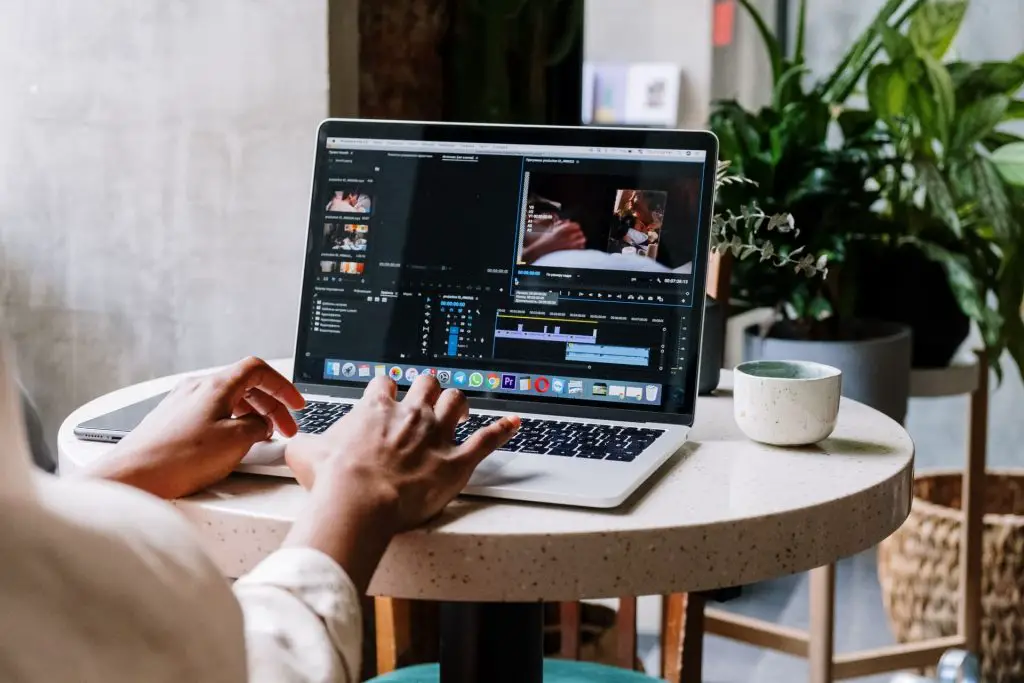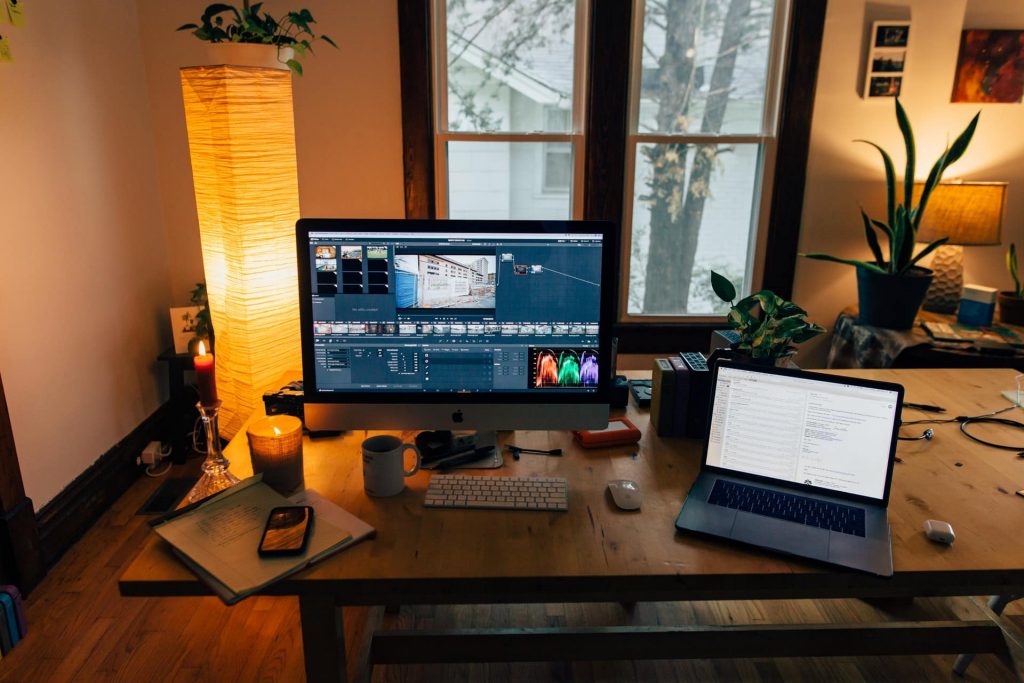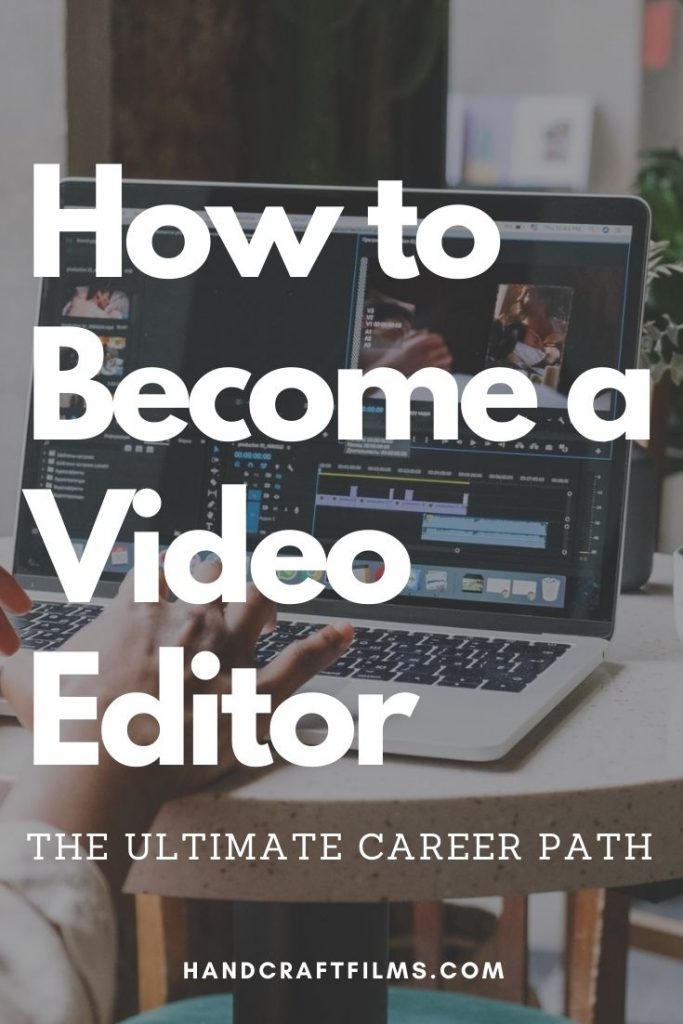Thinking about becoming a professional video editor? What exactly does a video editor do and how can you become one?
I can tell you first hand that it’s one of the most creative, fun, and rewarding careers out there.
In today’s post we’ll walk through exactly what steps you need to take in order to become a video editor yourself.
Let’s start by defining exactly who a video editor is and what they do.
What is a professional video editor?
Most simply put, a professional video editor is the person that literally puts a final video together.
Typically, you will begin with an idea or a vision of what your story or project should convey. Using video footage or other creative assets, you’ll weave them together using a computer software program (like Adobe Premiere Pro or Final Cut Pro) to tell that story.

You’ll be given raw footage files which may contain multiple takes of each scene. It’s your job to sort through all the footage, finding the best clips and using those to begin to make a video.
The video editor is in most cases also responsible for graphics within the video, including text and basic animations. As well as spoken dialogue, ambient audio, and music.
In some cases where the production is very large (Hollywood movies or network shows for example), there will be specialized professionals that handle components like audio and graphics.
While that is the most basic explanation for a video editor, it can truly mean so many different things. Depending on what projects you work on and exactly who you work for, your role can look very different.
Here are a few of the most common types of video editors.

1 | Video Editor for an Advertising, Marketing, or Creative Studio
I can speak first hand on this example, because this was my exact role for several years. I began working for an advertising firm as their ‘Video Content Creator’.
Prior to beginning this job, the advertising firm has always hired independent contractors to come in and complete video jobs. But as video projects became such a prominent request, they decided to start their own video department in house. And so my journey began.
I was the first to head up the video department team. As such, my role was not only video editor, but I was also the primary producer, director, shooter, and editor. Eventually as our team grew, we were able to assign each of those roles to individuals as their skills fit.
As the video editor, I participated in a few preliminary meetings with our team and/or client so that I fully understood the goals of the final video. As you’ll learn, your job as a video editor isn’t simply to push the buttons your client wants. Yes, you need to know the editing programs and have the technical skills down to use them, but there’s so much more.
What overall message did we need to convey? What feelings did we want the viewer to experience? What were the clients goals with this video? And many other important considerations that every video editor should know.
As the video editor, it’s your job to choose just the right clips, in the right order, with seamless transitions to tell that story the right way. You want need to be able to problem solve when you don’t have just the right clip to transition from one scene to another, because it will happen. A lot.
And you need to be able to manage your client. Learn how to show them better options than what they may have imagined in their head. They simply may not be able to imaging the possibilities without you showing them.

Organizing Footage
Next, once all the footage and creative assets (photography, logos, etc.) were collected, I would spend a good amount of time organizing every piece of the project into a cohesive folder.
Initial Edits
Once I was organized with my footage, I would begin my initial edits. Depending on the scope of the project, this could range anywhere from a few hours to several days or even weeks.
I would piece together clips of footage, audio files, and often times music and graphics to tell the whole story. Once a rough draft was created, it would be shown to our internal team for review.
Rough Draft and Review Process
The team would give me critical and constructive feedback and I would begin working on a refined edit of my rough cut. We would sometimes go through several rounds of internal reviews until we felt comfortable with a first draft to reveal to our client.
Final Draft to Client for Review
Next the client would preview the video edit. Typically they would have feedback and a handful of edits that we’d take back and continue working on. Once those were completed we had a final draft.

2 | Independent Contractor/Freelance Video Editor
This was my primary job before I began working for the ad agency. Basically, I worked for myself.
You essentially do all the same work as far as organizing and editing footage. However, if it’s just you, typically there are no internal reviews before sending your video drafts to your client. You’ll do this on your own.
The biggest difference is attracting new clients to hire you for ongoing video jobs. There are several ways to do this, but it’s something to keep in mind as it is an added component.
Not only are you a video editor, but you’re also a business owner and a marketer (for yourself). While it sounds glamorous to be your own boss, remember it can at times be more stressful and you are the primary one responsible for having constant work lined up in order to make money.
Common ways to generate new video work include word of mouth, online marketing, and finding wanted jobs through online postings. Most importantly, once you gain a new job: go above and beyond to make your clients happy and they’ll come back to you again and again. This is the number one best way to stay busy and have that extra job security as a freelancer.

3 | Video Editor for TV or Movies
When it comes to being a video editor for TV or movies, it’s a bit of a longer process that involves years of hard work and dedication to move through the ranks.
I’m not going to sugar coat it. You’ll have to work very hard to break into a successful career as a video editor in this field. Not to say it can’t be done. Of course it can. It just involves a good amount of time and effort. We’ll get to the details of those exact steps in a moment.
Most editors begin as production assistants, then becoming editing assistants or apprentices to senior editors in production studios and broadcasting stations. With more experience, you can work towards becoming a senior editor. But that makes it sound easy. It’s a field that’s more about having connections and proving yourself. More on this in a moment.
As a film editor, you will likely work on feature-length productions, making sure that the film follows the director’s creative vision. But again it could run the gamut depending on if you’re working on a feature film, a reality show, a scripted show, or a news broadcast. The ins and outs of each of these position can become very specific.
So How Do You Become a Video Editor?

Now that we’ve covered some of the most common types of video editing jobs out there, let’s talk about how to you get there.
Before you begin, you should do a little soul searching. Exactly what type of video editing appeals to you?
Do you want to edit wedding videos, commercials, or tv shows? Movies or documentaries? As we’ve discussed, these various types of positions differ greatly.
And the paths to become a video editor for each of these fields of work can look very different. That’s why it’s important to narrow down exactly what you’d like to pursue first.
Let’s divide our fields into two categories: commercial/freelance video editors and TV/movie video editors.
1 | The Career Path to Commercial and Freelance Video Editing
If you’d like to become a freelance video editor, the most important step is gaining knowledge and experience. You don’t necessarily even need a college degree or any art school experience to become a very successful and talented video editor.
With the world of knowledge that exists online through various course and even YouTube, it isn’t hard to teach yourself how to edit videos. Combine this with a mountain of growing experience and you should have no trouble landing those first few gigs.
You may consider offering some free videos at first, just to gain some experience and take the initial pressure off yourself. Try to focus on the genre of videos you are most interested in pursuing: is it weddings, corporate films, music videos?
You can often find wanted listings for these types of video gigs online.
In case you’re curious, here’s an article for freelancers on how much you should charge as a video editor.
While I do have a bachelor’s degree in fine arts, I didn’t have one at the time I first started taking on video editing projects. And you know what, most clients don’t ever know or even care about my degree.
I started out volunteering as a video editor for a local documentary that another filmmaker was putting together. That same year I shadowed a more seasoned editor that worked for a local broadcasting network. Even though I made zero money from those jobs, the experience I gained was invaluable.
If you have the opportunity to work with a more experienced video editor, even just as a volunteer, do it. Every time, do it. It’s an investment in your future career, cheaper than film school, and they may become the source of some of your future gigs.
Fast forward a few years later and some of those editors that I’d worked with in the past had too much work. Guess who they called when they needed to recommend another editor to their client? Yep. Me.
Let’s talk for a brief moment about starting a career path for a marketing/creative/or advertising agency.

For this position, it is important that you at least have a bachelor’s degree. Mine was in fine arts with a specialty in film, but that doesn’t necessarily have to be the case. Your degree could really be in just about anything. It’s more important that you have good work to show for it.
You’ll need to have a good amount of prior experience with a demo reel to display some of your previous video editing.
Because the agency will care a great deal about how you interact with companies and how you represent the agency, you’ll also need to demonstrate your excellent interpersonal communication skills.
You can best show this during the interview process. How you present yourself and articulate ideas. Emphasize your creativity, problem solving, as well as ease of managing clients and inter-office communication.
Don’t be afraid to start out at the bottom and work your way up. This is the case with any new job or career change. Arrive early, stay late, always be willing to go the extra mile, and do it with a positive attitude. Add to that a willingness to continually learn and improve your editing skills and you’ll go very far in your career no matter where you are.
You may start out as an editing assistant and then work your way up to senior editor or even a creative director. You may also find specialties within the field that interest you along the way, such as a motion graphics editor.
2 | The Career Path to TV and Movie Video Editing
This field is so vast depending on whether you want to work on live TV, reality TV, scripted TV, news broadcasts, or Hollywood films.

The typical career path may look something like this: post production assistant, editing apprentice, assistant editor, senior editor. And by the way, many editors make a career of being an assistant editor. They make good money and it’s still an excellent goal.
In addition, you likely will not be part of a union for a while as you need a lot of experience to apply to qualify to join the editor’s guild.
Until that point, you’ll be hired for short periods of time (6 months-2 years) depending on the project. It’s much like being a freelance editor, where you’ll need to be ready to find the next gig each and every time.
It sounds like a daunting career path. It isn’t easy, but let’s talk about some of the key principles that are sure to help no matter which path you take.
Don’t be afraid to start at the bottom.
Working as a video editor in TV and Hollywood is extremely competitive and there’s a lot of great talent already out there. In order to even have a chance, you may have to find any gig that you can and work your way up.
Much of this industry (like many others) is all about who you know. So be the production assistant. Bring everyone coffee and take their trash. But also, let them get to know you. Make a few friends or mentors. Tell them what you’re passionate about and let them know you want to learn more and are willing to work for pennies (or even for nothing).
If you get the chance to shadow a video editor, do it. Learn all you can and develop those relationships, because that’s the best chance you have of landing the next position that’s a little higher up.
Never stop learning.
In a field like video editing, technology and creative styles are constantly changing. You as an editor need to always be on your top game to stay on the edge of these trends. Work extra hours to make sure that you’re always improving and always learning.
Take on extra work, even if it doesn’t pay much, just to get more experience under your belt. You’ll end up using much of this work to create and grow your demo reel, as well as open yourself up to new relationships and potential job opportunities.
Be patient and willing to work overtime.
Like I mentioned before, breaking into a career as a senior editor for feature films or TV broadcasts isn’t easy. I won’t sugar coat it. If it’s your dream and you’re talented and work hard, then it can certainly be done. But it will require a lot of you.
It may take years of volunteer editing jobs before you can prove yourself to the right person and/or the right opportunity opens up. But if you are persistent and patient, that opportunity is likely to happen. So take jobs on your off time if you have to still work a full-time job to support yourself. Take on projects in the evenings and weekends to build up your reel and meet new people.
Concluding Thoughts
I hope you are encouraged to leap into this incredible field of video editing. There are thousands of great jobs out there to find your way. Sometimes the hardest part is just getting started. So don’t be afraid to just start wherever you can. You’ll learn and adapt as find your own path.
I’d love to hear from those of you who are video editors as well. What did your path look like?
-Beth
Share on Pinterest:

